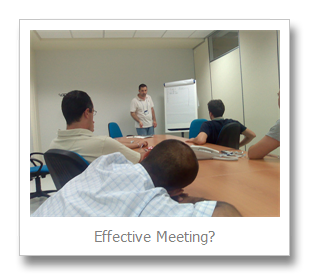Let’s face it, a lot of us don’t enjoy attending meetings and can often find them to be a bit of a struggle. They may even feel like a waste of time and sometimes dare I say it, they actually are!
It doesn’t have to be this way though and today I’m going to show you how to make the most your time by ensuring that all meetings you attend are effective. We’ll look at how a successful meeting is determined even before it’s begun and discuss what you can do to ensure you achieve the results you want from your meetings.
Subscribe now to make sure you catch all my posts and get exclusive content sent direct to your Email inbox or favourite RSS Reader.

"Start All Your Meetings In Pole Position"
Are Meetings Really Just a Waste of Time?
There seems to be a lot of “advice” out there suggesting that meetings are a waste of time and recommending that you should avoid them at all costs. That’s just plain ridiculous! As a Data Professional you have to work with others in order to be successful and deliver results.
Funnily enough, effective meetings do not just happen as if by magic. They require deliberate planning and preparation. If you are regularly leaving meetings feeling as though nothing has been achieved, then YOU are not doing enough preparation beforehand.
If you truly respect and value your time, then you should be taking appropriate steps to ensure all your meetings are effective.
Every Meeting I Attend is Effective, Yours Can Be Too
As with a lot of the work we DBAs perform, ensuring a successful outcome is often determined by having completed sufficient preparation. Ensuring a successful meeting is no different. Before you attend any meeting it is imperative that you have the answers to the following questions:
- What is the purpose of the meeting?

If you are not clear on what the purpose of the meeting is, then how can you be sure whether or not it is appropriate for you to attend? Just because you have been invited to attend, does not automatically mean that you should. The first step to ensuring effective meetings is to only attend those that you either need to or can add value to. If you decide to attend, make sure to either request or define a meeting agenda.
- What are the meeting objectives?
More specific and refined than the overall purpose of the meeting, these are the primary measure for determining a successful meeting. If not already explicitly defined by the meeting organiser, you should be able to determine the meeting objectives from the contents of the meeting agenda. If the meeting objectives are not clear, seek clarification from the meeting organiser before the meeting.
- What are your objectives for the meeting?
Not to be confused with the meeting objectives, although there will likely be some overlap. Before you attend a meeting, you should have clear in your mind what it is that you want to achieve. Maybe there is a topic that you would like to have discussed or a decision to have been reached? If so, consider raising these with the meeting organiser for inclusion in the agenda.
- Do you have everything you need for the meeting?
In order to add value to a meeting you need to be able to actively contribute to it. You can only do this of course if you have actually prepared any information that you may require, in advance of the meeting. Dependant on the objectives, this could be as simple as getting your thoughts in order ready for further discussion or it could be more formal, such as preparing documentation or a report (bonus points if you share and distribute this type of material with attendees, before the meeting). Whatever you do, don’t try and wing it. As part of your preparation ask yourself questions such as, what is expected of me at this meeting and do I have the information required in order to deliver on the objectives of the meeting?
Start Ensuring Your Meetings Are More Effective Right Now
As a task, go through your calendar and review your upcoming meetings for the next week. Are you sufficiently prepared for them? Are you able to answer the questions we have outlined above? Use the instruction in this post to help you prepare for your meetings and be sure to let me know how you get on.
Your most valuable asset is time and by ensuring you have effective meetings you can make the best use of yours. I hope you have enjoyed this post and that it helps you on your path towards more effective meetings.



